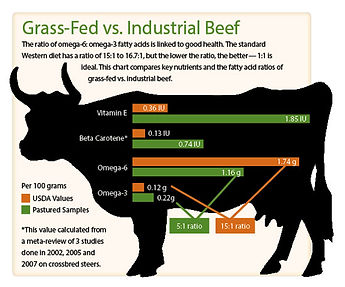
Fats
3. "I've been very interested in high fat-low carb diets."
"Health Fat vs. Unhealthy Fat?"
Healthy Fats are in the form of Omega 3’s and although Omega 6’s are essential, an abundance in the diet can cause inflammation and lead to disease. Research has shown that what is most important for optimal health isn't to avoid omega-6 fatty acids, but to lower the ratio of omega 6 fatty acids to omega 3's, since the western diet usually consists of a 1:15 ratio. A ratio of 1:1-1:5 is shown to be beneficial and improve vitality.
Omega-3 fatty acids are reported to have anti-inflammatory properties and are neglected in the modern day diet. Some examples: walnuts, chia seeds, flax, roe, salmon, oysters, herring, wild game, pastured grass-fed animal products lamb, and organ meats. ex. liver, heart
Healthy/Anti-Inflammatory
Vs.
Unhealthy/Inflammatory Fats
Pasture Grass-Fed Animal Products
As you can see in the photo above, grass-fed milk has an optimal ratio of omega-3 to omega-6, and that is because the animals are not eating grains. Grains fatten them up, cause "marbling", increase the amounts of omega-6 in their blood, and decrease their omega-3 fatty acids.
Just like humans...on a grain diet, we gain weight, have more omega-6's running through our blood and less omega-3's. When we consume Grass-Fed animals and animal products, like our ancestors did, we get the ideal rations of omega's.

Healthy vs. Unhealthy Examples
Now that we covered Pasture Grass-Fed Foods, lets discuss some of the oil products which get marketed as "healthy" when in reality are the causes for inflammation. Our ancestors were raised cooking with animal fats like butter, ghee, lard, etc. and some plant fats like coconut and olive oils. It wasn't until about 100 years ago when vegetable oils came onto the market and that is when we saw a huge increase in chronic disease.
The oil industry began promoting vegetable oils (sunflower, canola, soybean). These oils don't have cholesterol and saturated fat. They were firmly committed to broadcasting that the animal fats were causing heart disease and raising cholesterol in the blood. The omega-6 content in vegetable oils is extremely high and produce inflammatory toxic by-products.
When it comes to plant oils, use olive, coconut, palm, and flaxseed. These are beneficial in moderation and not high heat cooking. Coconut oil can be heated at low temperatures, but because these oils have low-heating points, at high temperatures they emit carcinogens.





